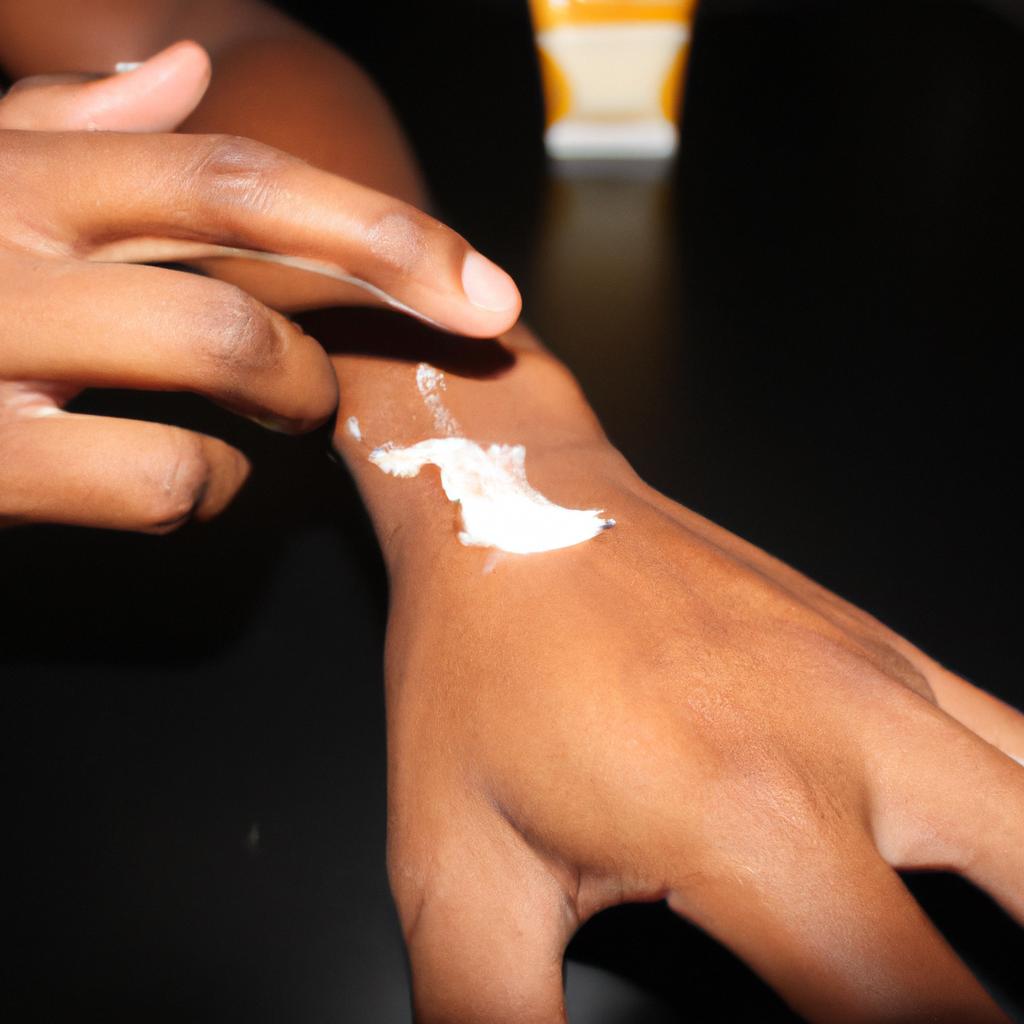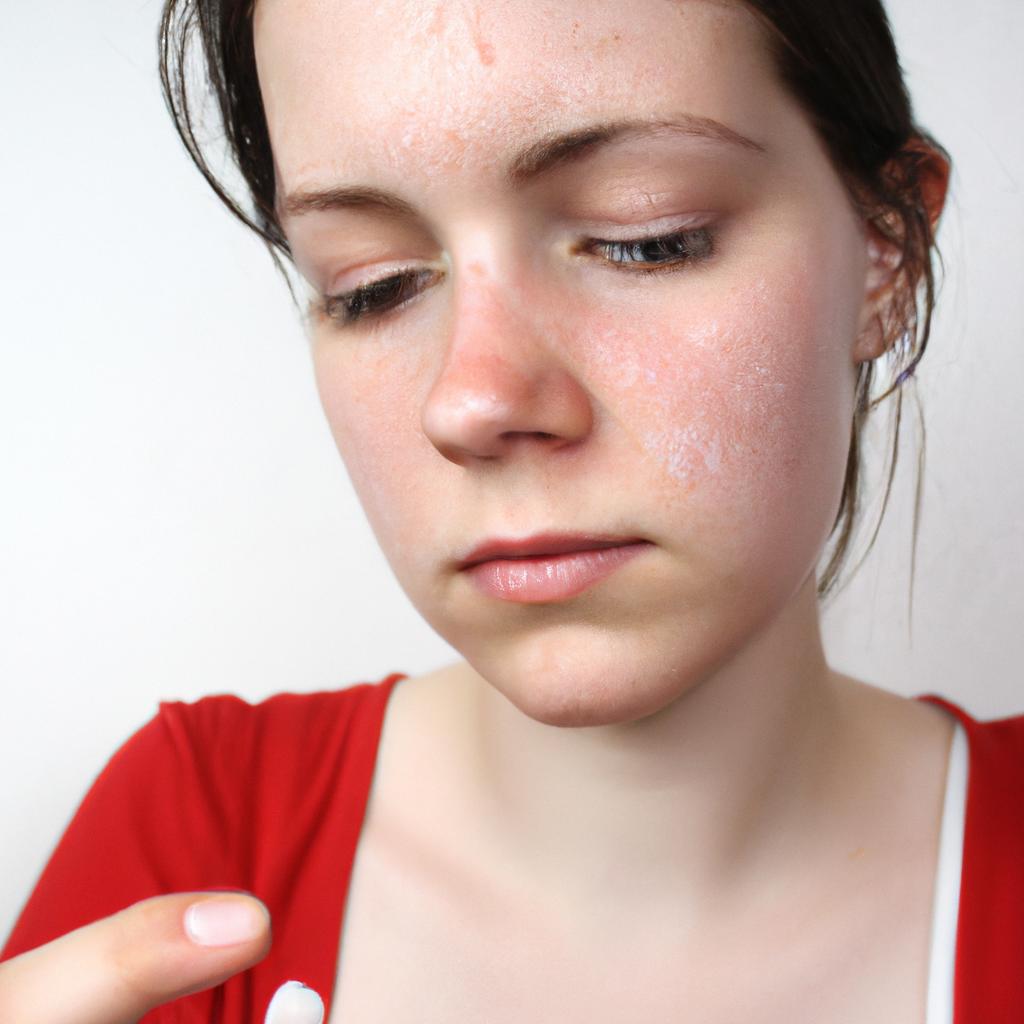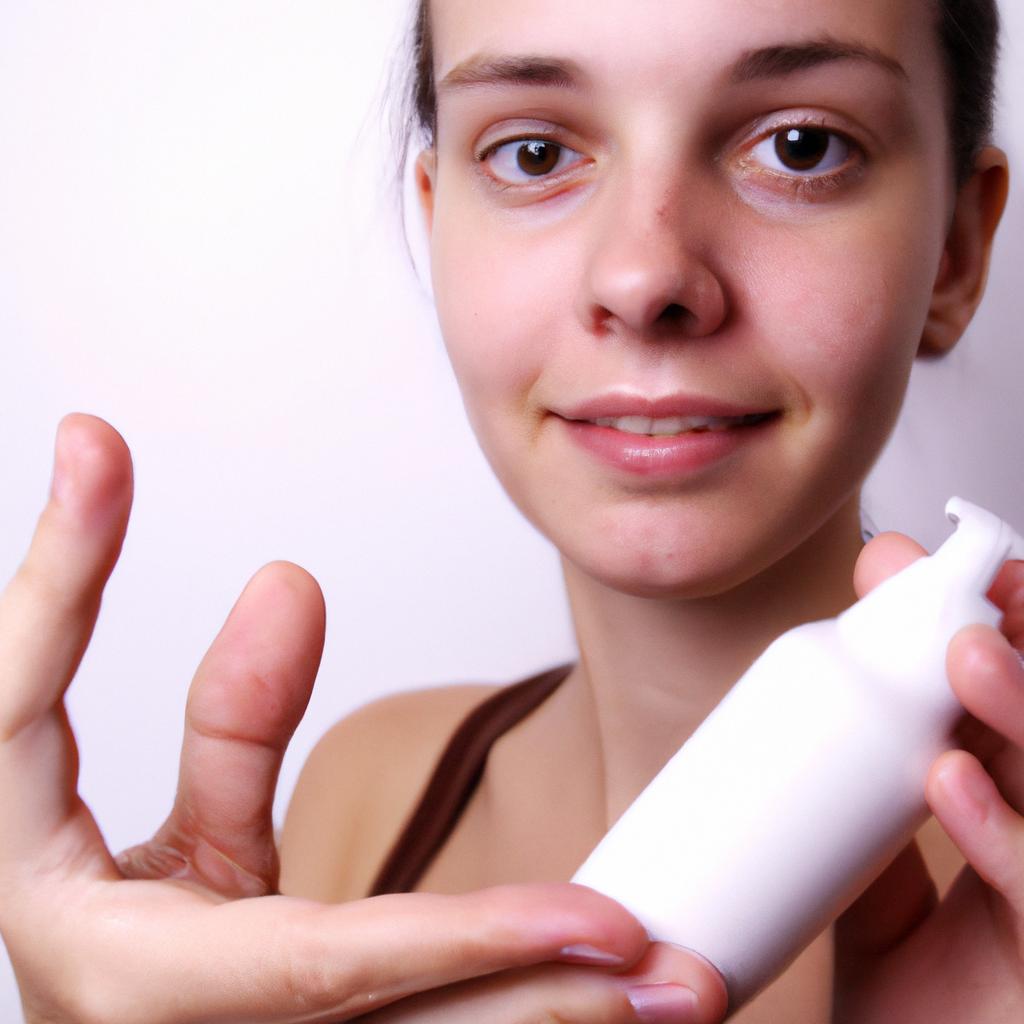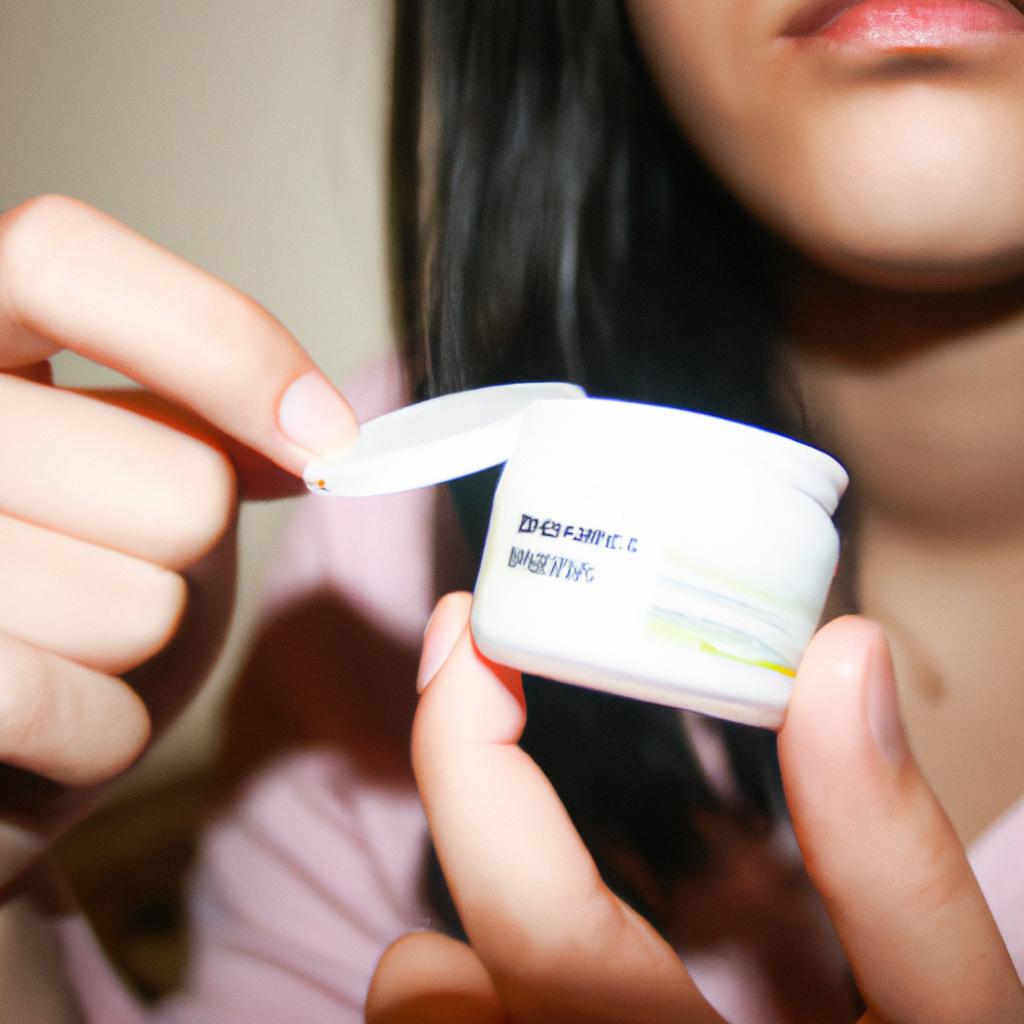Dryness is a prevalent issue faced by individuals who rely on skin care products as part of their daily routine. This problem can be particularly frustrating, as it contradicts the very purpose that these products are intended to serve – moisturizing and nourishing the skin. For instance, consider the case of Sarah, a middle-aged woman who diligently follows her skincare regimen every morning and night. Despite using high-end moisturizers and serums, she continues to experience dry patches on her face, leaving her feeling dissatisfied with the effectiveness of these products.
The prevalence of dryness in skin care products poses a significant concern for both consumers and manufacturers alike. While there may be various underlying factors contributing to this issue, such as individual differences in skin composition or environmental conditions, it is crucial to address this problem comprehensively. This article aims to explore the reasons behind dryness in skin care products and propose potential solutions to mitigate its occurrence. By examining scientific research studies and analyzing consumer feedback, we will delve into the complexities surrounding this matter while offering practical insights for consumers seeking effective remedies against dryness caused by skincare products.
Understanding the causes of dry skin
Understanding the Causes of Dry Skin
Dry skin is a common problem that affects millions of individuals worldwide. It can be caused by various factors, ranging from environmental conditions to personal habits and underlying health issues. By understanding these causes, we can better address the issue and provide effective solutions for dry skin.
To illustrate one example, consider a hypothetical scenario where an individual experiences persistent dryness on their hands. Despite regular application of moisturizers, the condition does not improve significantly. This case study highlights the complexity of dry skin problems and emphasizes the need for a comprehensive understanding.
There are several key factors that contribute to dry skin:
-
Environmental Factors:
- Low humidity levels: Dry air, particularly in colder climates or heated indoor environments, can deplete moisture from the skin.
- Excessive exposure to sunlight: Prolonged sun exposure without proper protection can cause dehydration and damage to the skin’s natural barrier function.
- Harsh weather conditions: Cold winds, low temperatures, and high altitudes can all contribute to increased water loss from the skin.
-
Personal Habits:
- Frequent hot showers or baths: Hot water strips away natural oils from the skin, leading to dryness.
- Overuse of harsh soaps or cleansers: Certain products contain chemicals that disrupt the skin’s pH balance and strip away its protective oils.
-
Underlying Health Issues:
- Medical conditions like eczema or psoriasis: These chronic inflammatory disorders impair the skin’s ability to retain moisture effectively.
- Hormonal imbalances: Fluctuations in hormone levels can affect sebum production, resulting in drier skin.
-
Age-related Factors:
- Aging reduces oil gland activity and decreases collagen production, making elderly individuals more prone to dryness.
By recognizing these causes and taking appropriate measures, such as using gentle cleansers, avoiding prolonged exposure to extreme weather conditions, and maintaining a consistent moisturizing routine, individuals can effectively manage and prevent dry skin.
Transitioning into the subsequent section about “Identifying common misconceptions about dryness,” it is crucial to address prevalent beliefs that may hinder proper understanding and treatment of this issue.
Identifying common misconceptions about dryness
Understanding the causes of dry skin is essential for addressing this common issue in skincare products. Let’s delve deeper into some key factors that contribute to dryness and explore how they can be effectively managed.
One example of a potential cause of dry skin is excessive cleansing. In an attempt to maintain cleanliness, individuals may over-wash their faces or bodies with harsh soaps or cleansers. This strips away natural oils on the skin’s surface, leading to dryness and irritation. To combat this, it is important to use gentle cleansers specifically formulated for different skin types, ensuring that the moisture barrier remains intact.
In addition to excessive cleansing, environmental factors can also play a significant role in causing dryness. Exposure to extreme temperatures, low humidity levels, or harsh winds can deplete the skin’s moisture content and disrupt its protective barrier function. It is crucial to shield the skin from these elements by using appropriate moisturizers and wearing protective clothing when necessary.
Furthermore, certain medical conditions and medications can contribute to dry skin problems. For instance, individuals with eczema or psoriasis often experience chronic dryness as part of their condition. Similarly, certain medications like diuretics or retinoids may lead to increased water loss through the skin. When dealing with such cases, consulting a healthcare professional becomes imperative in order to identify suitable treatment options while managing the underlying conditions.
To summarize these causes effectively and engage readers emotionally:
- Over-washing: The constant need for hygiene should not come at the expense of healthy skin.
- Environmental factors: Mother Nature doesn’t always favor our complexion; we must protect our skin against her harshest forces.
- Medical conditions: Dryness isn’t always within our control; sometimes it requires medical expertise.
- Medications: The quest for better health shouldn’t sacrifice our body’s largest organ – proper care is paramount.
Let us now turn our attention towards debunking common misconceptions about dryness and explore the impact it has on skin health. By understanding these misconceptions, we can take more informed steps to address dryness effectively.
Exploring the impact of dryness on skin health
Identifying common misconceptions about dryness often leads to a better understanding of the issue at hand. However, it is equally important to explore the impact of dryness on skin health in order to fully address the problem. Let us delve deeper into this topic.
Imagine a scenario where an individual purchases a highly recommended moisturizer for their dry skin. They diligently apply the product as instructed, expecting their skin to become hydrated and smooth. To their surprise, instead of experiencing relief from dryness, they notice that their skin becomes even drier and more irritated than before. This perplexing situation highlights one of the many challenges faced by consumers when dealing with dryness in skincare products.
To shed light on this matter, let us consider some key factors that contribute to the problem:
- Ingredient Sensitivity: Certain ingredients commonly found in skincare products can aggravate dryness rather than alleviate it. For instance, alcohol-based formulas may strip away natural oils from the skin’s surface, leading to increased dryness and irritation.
- Moisture Barrier Disruption: The outermost layer of our skin acts as a protective barrier against external factors such as pollution and moisture loss. When this barrier is compromised due to various reasons like harsh cleansing routines or environmental aggressors, the result is often increased dryness.
- Product Compatibility: Each individual has unique skin needs and preferences. What works effectively for one person might not necessarily yield similar results for another. Finding the right balance between hydration and nourishment tailored to specific skin types is crucial.
- Lack of Education: Misinformation regarding skincare products can further exacerbate issues related to dryness. Without proper knowledge about ingredient labels or suitable application techniques, individuals may unknowingly worsen their condition.
In order to visually depict these challenges faced by individuals struggling with dryness in skincare products, let us take a look at the following table:
| Challenges Faced | Impact on Skin |
|---|---|
| Ingredient Sensitivity | Increased dryness and irritation |
| Moisture Barrier Disruption | Higher susceptibility to external factors |
| Product Compatibility | Ineffectiveness of moisturizers leading to persistent dryness |
| Lack of Education | Unintentional worsening of the condition due to misinformation |
Understanding these challenges can help consumers navigate their way through the vast array of skincare products available in the market. By considering individual needs, seeking appropriate guidance from skincare experts, and making informed choices, individuals can take steps towards effectively addressing dryness-related concerns.
Transitioning into examining potential side effects of dry skin, it is essential to understand how prolonged or severe dryness may affect overall skin health.
Examining the potential side effects of dry skin
Consider a hypothetical scenario where an individual, let’s call her Sarah, purchases a highly recommended skin care product that promises to moisturize and nourish her skin. However, instead of experiencing the desired results, she notices that her skin becomes even drier than before. This common issue highlights the importance of understanding the impact of dryness on skin health. In this section, we will delve deeper into this problem and explore its consequences.
Consequences of Dryness:
The detrimental effects of dryness on the skin cannot be underestimated. When the skin lacks adequate moisture, it can lead to several problems such as:
- Increased Sensitivity: Dry skin tends to be more sensitive and prone to irritation due to its compromised barrier function.
- Premature Aging: The loss of moisture can contribute to the appearance of fine lines and wrinkles, making the skin appear aged prematurely.
- Impaired Healing Process: Dryness inhibits the natural healing process of the skin, leading to delayed wound repair and prolonged recovery from various dermatological conditions.
- Inflammation: The lack of hydration in the skin can trigger inflammatory responses, resulting in redness, itchiness, and discomfort.
To better understand these consequences visually, consider the following table:
| Consequence | Description |
|---|---|
| Increased Sensitivity | Dry skin is more prone to irritation due to impaired barrier function |
| Premature Aging | Loss of moisture contributes to premature appearance of fine lines and wrinkles |
| Impaired Healing Process | Lack of hydration delays wound repair and recovery from dermatological conditions |
| Inflammation | Dehydration triggers inflammation in the form of redness, itchiness, and discomfort |
Highlighting Effective Strategies:
Understanding how dryness impacts our overall skin health is crucial for addressing this concern effectively. In the subsequent section, we will explore strategies that can combat dryness and promote optimal skin hydration. By implementing these techniques, individuals like Sarah can reclaim their skin’s health and vitality.
Now, let us delve into effective strategies to combat dryness and rejuvenate your skin.
Highlighting effective strategies to combat dryness
Examining the potential side effects of dry skin, it is crucial to understand the various problems that can arise from this condition. One example worth considering is the case of a 35-year-old woman who experienced severe dryness after using a popular skincare product. Despite following the recommended usage guidelines, her skin became excessively dry and irritated within a week of starting the regimen.
To shed light on such issues, let us delve into some common problems associated with dryness in skincare products:
- Increased sensitivity: Dry skin tends to be more sensitive and prone to irritation. This can lead to redness, itching, and discomfort when using certain products that contain potentially irritating ingredients or harsh chemicals.
- Impaired barrier function: The outermost layer of our skin acts as a protective barrier against external elements. However, excessive dryness can compromise this barrier’s integrity, making it easier for irritants and allergens to penetrate the skin.
- Aggravation of existing conditions: Individuals with pre-existing skin conditions like eczema or psoriasis may find that their symptoms worsen when using drying skincare products. These conditions often require gentle care and moisturization to maintain healthy skin.
- Delayed healing process: Dryness can also hinder the natural healing process of the skin. It slows down cell turnover and collagen production, which are vital for repairing damaged tissue and maintaining youthful-looking skin.
- Reduce discomfort and itchiness caused by dryness
- Enhance overall skincare routine efficacy
- Maintain optimal moisture levels for healthier-looking skin
- Improve self-confidence by alleviating visible signs of dryness
Furthermore, we can illustrate key points regarding addressing dryness in skincare through an informative table:
| Strategies | Benefits |
|---|---|
| Choose gentle cleansers without harsh detergents | Minimizes stripping natural oils |
| Look for moisturizers with hydrating ingredients like hyaluronic acid | Enhances skin’s moisture retention |
| Avoid products containing alcohol or fragrance | Reduces potential irritation and dryness |
| Consider incorporating a humidifier in your living space | Adds moisture to the air, benefiting overall skin hydration |
With an understanding of the problems associated with dryness in skincare products, it is evident that addressing these concerns is crucial. In doing so, individuals can improve their skin health and enhance their overall well-being. The next section will provide valuable tips for selecting suitable moisturizing products without compromising on efficacy or safety.
Tips for selecting suitable moisturizing products
Highlighting Effective Strategies to Combat Dryness
Having discussed the importance of addressing dryness in skin care products, let us now explore effective strategies that can help combat this issue. To illustrate these strategies, consider the case study of Sarah, a 35-year-old woman who has been experiencing dry and flaky skin despite using various moisturizers.
Sarah’s experience serves as an example of how individuals may struggle with finding suitable solutions for their dryness concerns. However, there are several proven approaches that can be adopted to alleviate this problem:
-
Hydrating Ingredients: Look for moisturizing products that contain hydrating ingredients such as hyaluronic acid or glycerin. These substances attract moisture from the environment and bind it to the skin, providing long-lasting hydration.
-
Barrier Repair: Opt for skincare formulations that focus on repairing the skin’s natural barrier function. This is crucial in preventing water loss and maintaining adequate levels of hydration. Products containing ceramides or fatty acids help reinforce the protective barrier and retain moisture within the skin.
-
Humectants: Incorporate humectant-rich products into your skincare routine. Humectants like urea or lactic acid draw water molecules towards themselves, keeping the skin hydrated throughout the day.
-
Regular Exfoliation: Include gentle exfoliation in your regimen to remove dead skin cells and promote better absorption of moisturizing products. Exfoliating agents like alpha-hydroxy acids (AHAs) enhance cell turnover, allowing fresh layers of skin to emerge while reducing dryness.
| Strategy | Benefit | Example Product |
|---|---|---|
| Hydrating Ingredients | Attract moisture and provide lasting hydration | Hyaluronic Acid Serum |
| Barrier Repair | Strengthen protective barrier and prevent water loss | Ceramide Moisturizer |
| Humectants | Draw water molecules to the skin and maintain hydration | Urea Cream |
| Regular Exfoliation | Remove dead skin cells and aid in product absorption | AHA Facial Scrub |
These strategies, when implemented thoughtfully, can help combat dryness effectively. By incorporating products with hydrating ingredients, focusing on barrier repair, using humectants, and regularly exfoliating, individuals like Sarah can improve their skin’s moisture balance and achieve a healthier complexion.
Remember that finding the right combination of strategies may require some experimentation as everyone’s skin is unique. It is advisable to consult a dermatologist or skincare specialist for personalized recommendations based on your specific needs and concerns. Taking proactive steps towards addressing dryness will not only enhance the effectiveness of your skincare routine but also promote overall skin health.
 Stanley Beauty Care
Stanley Beauty Care



